Key takeaways:
- Engaging in wildlife conservation fosters community spirit and collective responsibility, illustrated by local volunteering efforts like tree planting and clean-ups.
- Personal encounters with nature, such as observing wildlife and participating in habitat restoration, enhance appreciation for ecosystems and motivate conservation actions.
- Volunteering cultivates emotional connections with fellow volunteers, driving shared experiences that strengthen community bonds and communication skills.
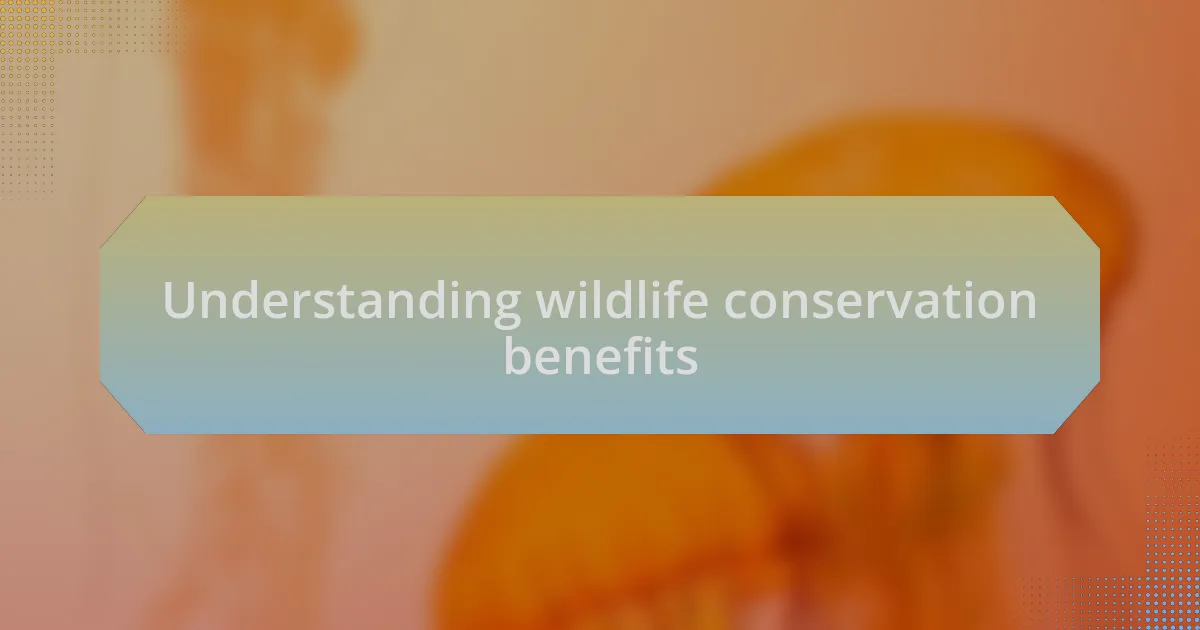
Understanding wildlife conservation benefits
Engaging in wildlife conservation has shown me just how interconnected our ecosystems truly are. I once participated in a local clean-up at a nearby wetland and was struck by how litter affects not just the water quality but also the animals that depend on that habitat. Isn’t it incredible to think that our actions can have such a direct impact on the survival of countless species?
One thing that stands out to me is how volunteering fosters community spirit while making a positive environmental impact. During a recent tree-planting event, I was amazed at how many neighbors joined in, each of us working side by side to create a healthier environment. It made me realize: when did protecting our planet become a collective effort?
Wildlife conservation also helps nurture a deeper sense of responsibility towards nature. I remember a time when I taught kids about local wildlife during a conservation camp, and their excitement made me see the world through fresh eyes. Witnessing their curiosity sparked a question in me: how can we inspire the next generation to protect these precious creatures? This emotional connection not only drives my passion but emphasizes the importance of conserving wildlife for future generations.
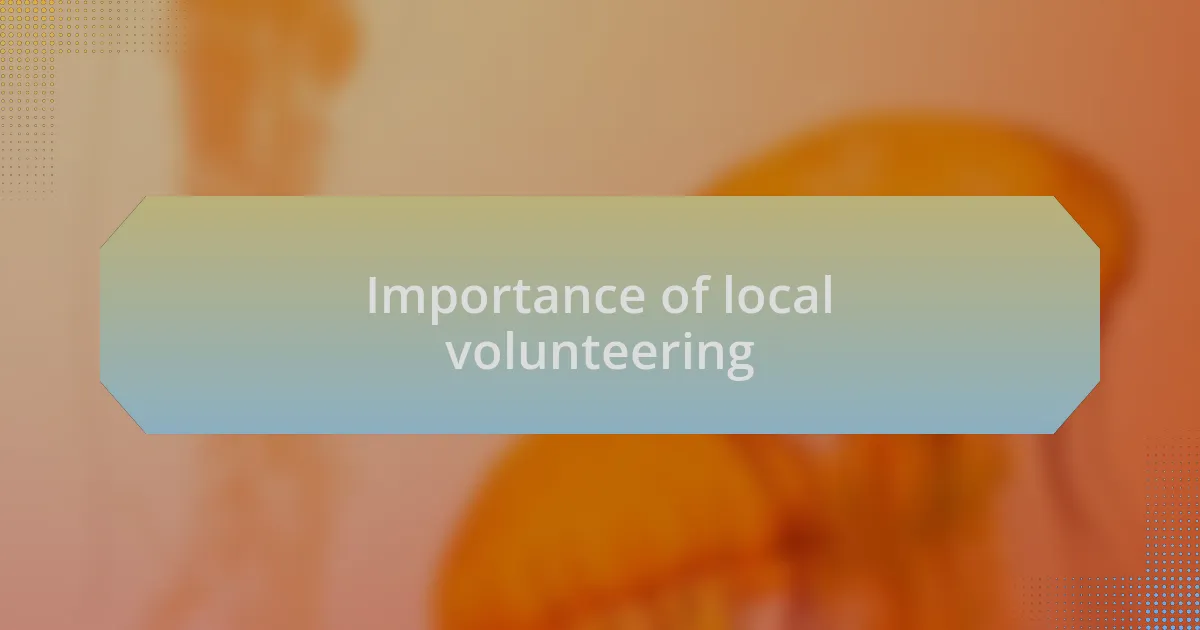
Importance of local volunteering
Volunteering locally is essential because it creates an immediate impact in our communities. I remember the first time I helped with a grassroots project to restore a native plant garden. Witnessing the transformation of the space into a vibrant habitat for local pollinators was rewarding, reminding me how small efforts can lead to profound changes. Isn’t it remarkable to think that just a few hours of our time can revitalize an ecosystem?
When we volunteer within our own neighborhoods, we also build connections with like-minded individuals. I joined a local wildlife monitoring group and, over time, developed friendships that extend beyond our shared mission. This camaraderie keeps me motivated and engaged. Who wouldn’t want to work with others who share a passion for the environment?
Furthermore, local volunteering fosters a stronger sense of stewardship. I once took part in a campaign to protect a local river, witnessing firsthand how our actions could safeguard that resource for future generations. Each cleanup and educational workshop made it clear: we have a direct role in shaping the future of our natural surroundings. How can we not feel a responsibility to act when the benefits are so clear?
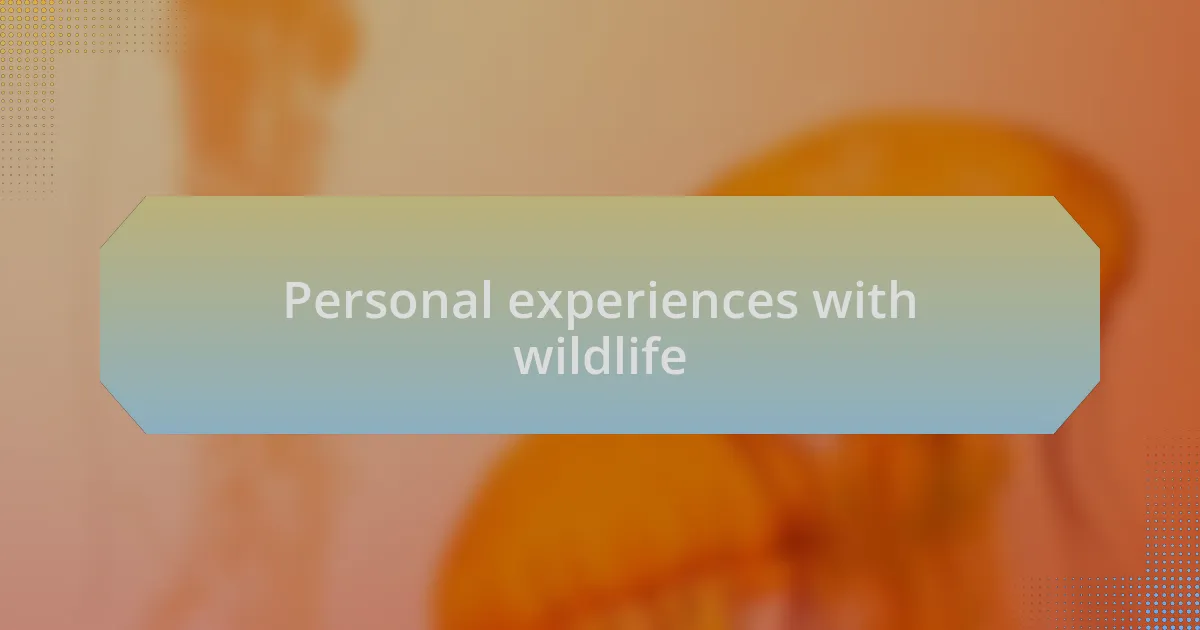
Personal experiences with wildlife
I remember the thrill of my first encounter with a wild animal in its natural habitat. While volunteering at a local wildlife refuge, I was fortunate enough to see a mother deer and her fawn grazing nearby. The sight was incredibly moving; it felt as though I was witnessing a precious moment in their lives, an interaction that reminded me just how important it is to protect their environment. Have you ever felt that sense of connection with wildlife?
Another memorable experience was during a beach cleanup when we stumbled across a sea turtle nest. I felt a rush of excitement mixed with vulnerability—knowing that our actions could influence the survival of those tiny hatchlings made me realize the delicate balance within ecosystems. This moment sparked a deeper understanding in me of the interconnectedness of all living beings. Isn’t it amazing how one simple moment can shift your perspective?
One evening, as I was wrapping up my shift at the wildlife center, I was greeted by a chorus of frogs near a pond. The sound was enchanting, almost like nature’s lullaby. It struck me then how vital healthy wetlands are for countless species. It left me pondering: how often do we overlook the small yet crucial elements of our ecosystem? This realization drives my commitment to conservation and the importance of volunteer work in protecting these cherished habitats.
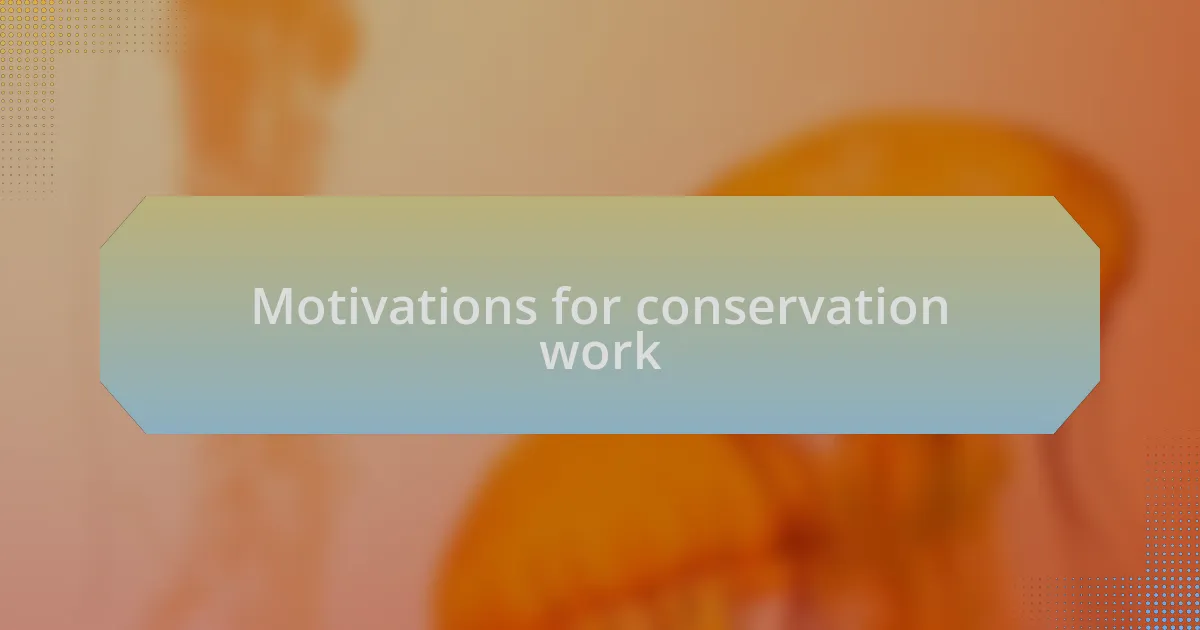
Motivations for conservation work
When I first joined a local conservation group, my motivation was fueled by a deep-seated love for nature. I distinctly remember the first day planting trees alongside community members; the collective effort and enthusiasm created a powerful energy. It wasn’t just about the trees; it was about nurturing a shared vision of a healthier planet. Have you ever been part of something that felt bigger than yourself?
Reflecting on my experiences, I realize that my motivations are often rooted in the stories of the animals we seek to protect. I once volunteered for an initiative that focused on rehabilitating injured raptors. Each bird we nursed back to health had a unique journey, and hearing their stories made the work feel deeply meaningful. Didn’t it make you think about the real lives behind conservation efforts, rather than merely treating them as statistics?
Moreover, the stark reality of environmental degradation often served as a wake-up call for me. One afternoon, while walking through a once-thriving wetland, I was struck by the silence—no birds singing, no frogs calling. It was as if the loss echoed the importance of our work. That moment was a powerful reminder: our planet’s health depends on our actions. How much longer can we ignore these signs before it’s too late? Each of these experiences reinforces my commitment to conservation and the pressing need for collective action.
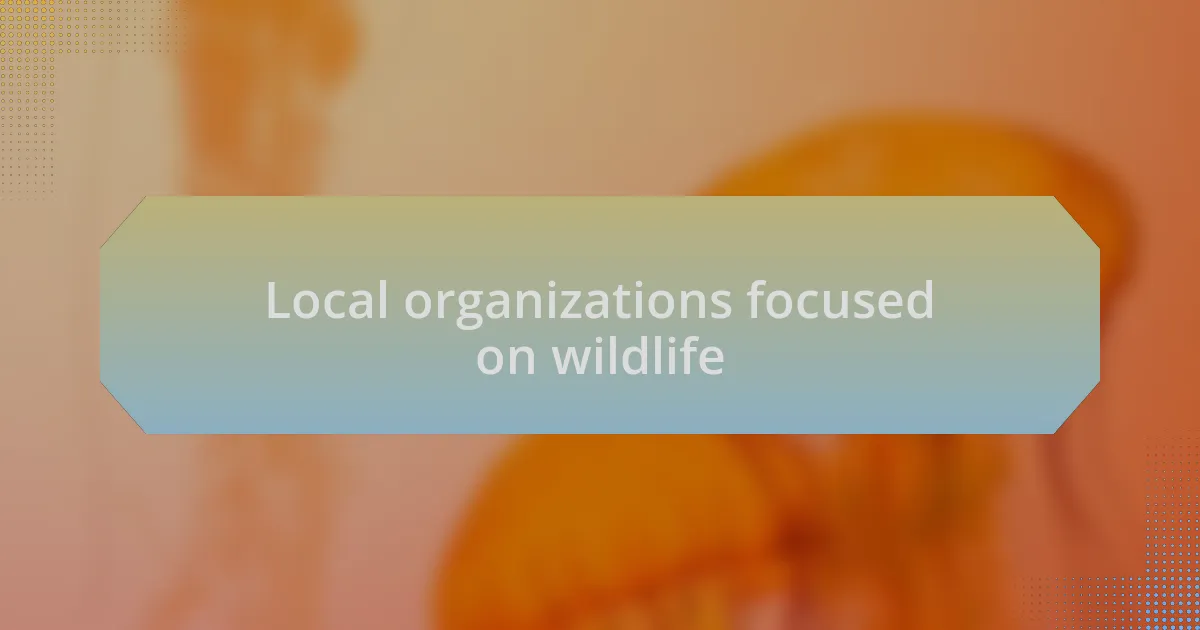
Local organizations focused on wildlife
One of the most striking aspects of local wildlife organizations is their ability to connect communities with nature. I vividly recall volunteering with a group dedicated to preserving a local wetlands area. We organized educational tours, and seeing the excitement in children’s eyes as they spotted a heron for the first time was incredibly rewarding. It makes you wonder, how can we cultivate that sense of wonder in younger generations to inspire lifelong advocates for wildlife?
Another organization I collaborated with focused on the conservation of native plant species, which are essential for supporting local wildlife. During a workshop, a participant shared how planting native flowers transformed her garden into a buzzing habitat for pollinators. It struck me how individual efforts can ripple outward, creating a much larger impact. Isn’t it fascinating to think that one person’s effort can inspire a whole neighborhood to become more aware of their ecological footprint?
I often find myself reflecting on the collaborative spirit that exists within these organizations. Last summer, I joined a team in a coastal cleanup initiative, where we not only removed debris but also engaged in crucial discussions about the impact of plastic on marine life. Seeing how passionate people were about driving change was invigorating. Have you ever felt that electric buzz of camaraderie while working together toward a common goal? Those moments rejuvenate my belief that grassroots efforts are where real change begins.
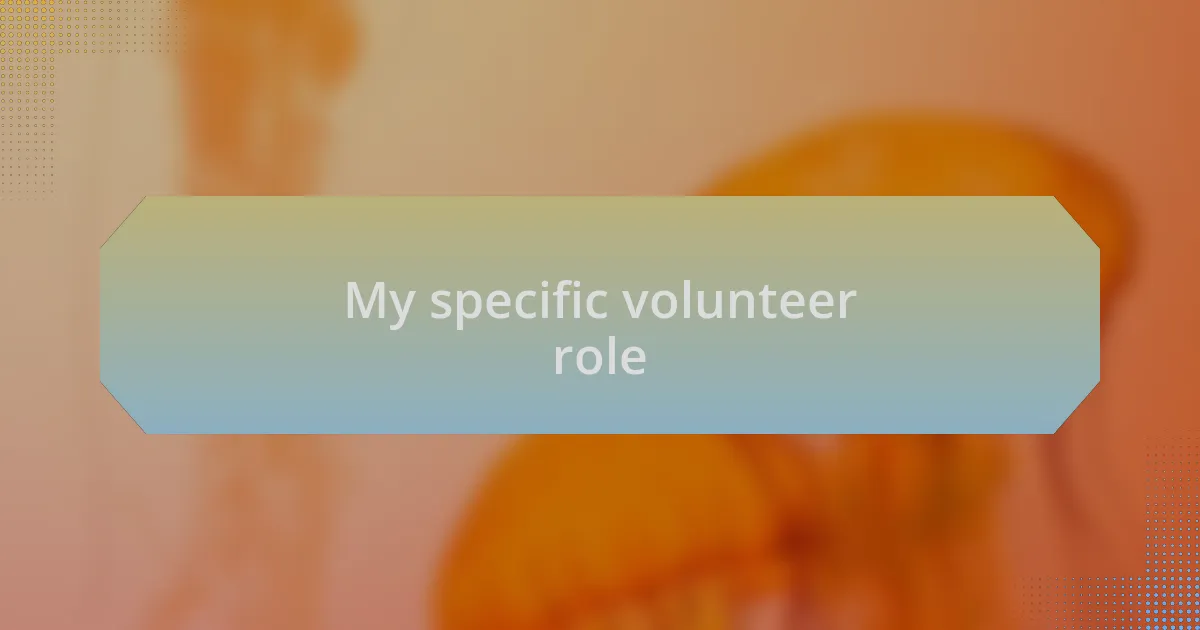
My specific volunteer role
One of the most fulfilling roles I held while volunteering was as a wildlife tracker for a local conservation group. I remember my first day in the field, equipped with nothing but a notepad and my curiosity. As I walked along the trails, noting paw prints and droppings, I felt a deep connection with the environment. It made me realize that every small detail plays a significant role in understanding the ecosystems around us. Have you ever experienced that thrill of discovering something unexpected in nature?
In another instance, I assisted in habitat restoration projects, where we planted new trees and native shrubs. The joy I felt as I watched each sapling take root brought a sense of hope for the future of our local wildlife. Just standing there, surrounded by fellow volunteers, I couldn’t help but feel that we were part of something much bigger than ourselves. It made me ponder the legacy we leave for the next generation—what kind of natural world do we want them to inherit?
My role involved educational outreach, where I spoke to community members about the importance of biodiversity. I recall a particularly impactful day when a local teacher approached me, eager to incorporate our insights into her science curriculum. It was a moment that reaffirmed my belief in the power of knowledge-sharing. Isn’t it amazing how a simple conversation can pave the way for deeper understanding and inspire collective action in wildlife conservation?
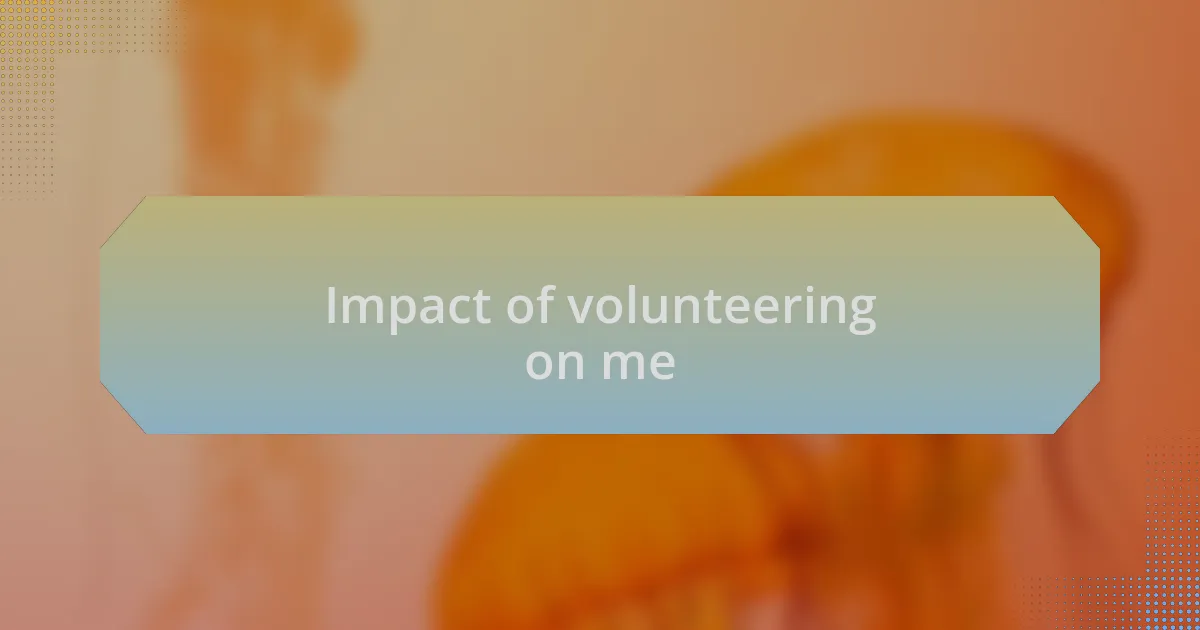
Impact of volunteering on me
Volunteering has profoundly shaped my perspective on nature and my place within it. I vividly remember staring at a flock of birds taking flight, their wings cutting through the azure sky. In that moment, I realized that I was not just an observer but part of a delicate balance that requires care and attention. How often do we take a step back to appreciate the intricate web of life around us? This experience taught me the importance of stewardship, igniting a passion for conservation that I now carry into every aspect of my life.
The emotional connections I formed with fellow volunteers became a source of strength during challenging times in the field. I think of one moment when we found an injured animal; the collective urgency we felt to help was palpable. Sharing the excitement of recovery or the sorrow of loss created an unspoken bond among us. Do you ever think about how shared experiences can elevate our understanding of compassion and community? Each encounter reinforced my belief that working together amplifies our impact, both on our environment and on each other.
I’ve also noticed that my communication skills have flourished as a result of volunteering. Crafting messages that resonate with diverse audiences has become second nature to me. I recall a day spent planning a workshop where I could see the lights go on in people’s eyes as they connected with conservation issues. Have you ever felt the thrill of inspiring someone to take action? That’s the essence of volunteering for me—transforming knowledge into motivation, and witnessing the ripple effect of our efforts in the community.